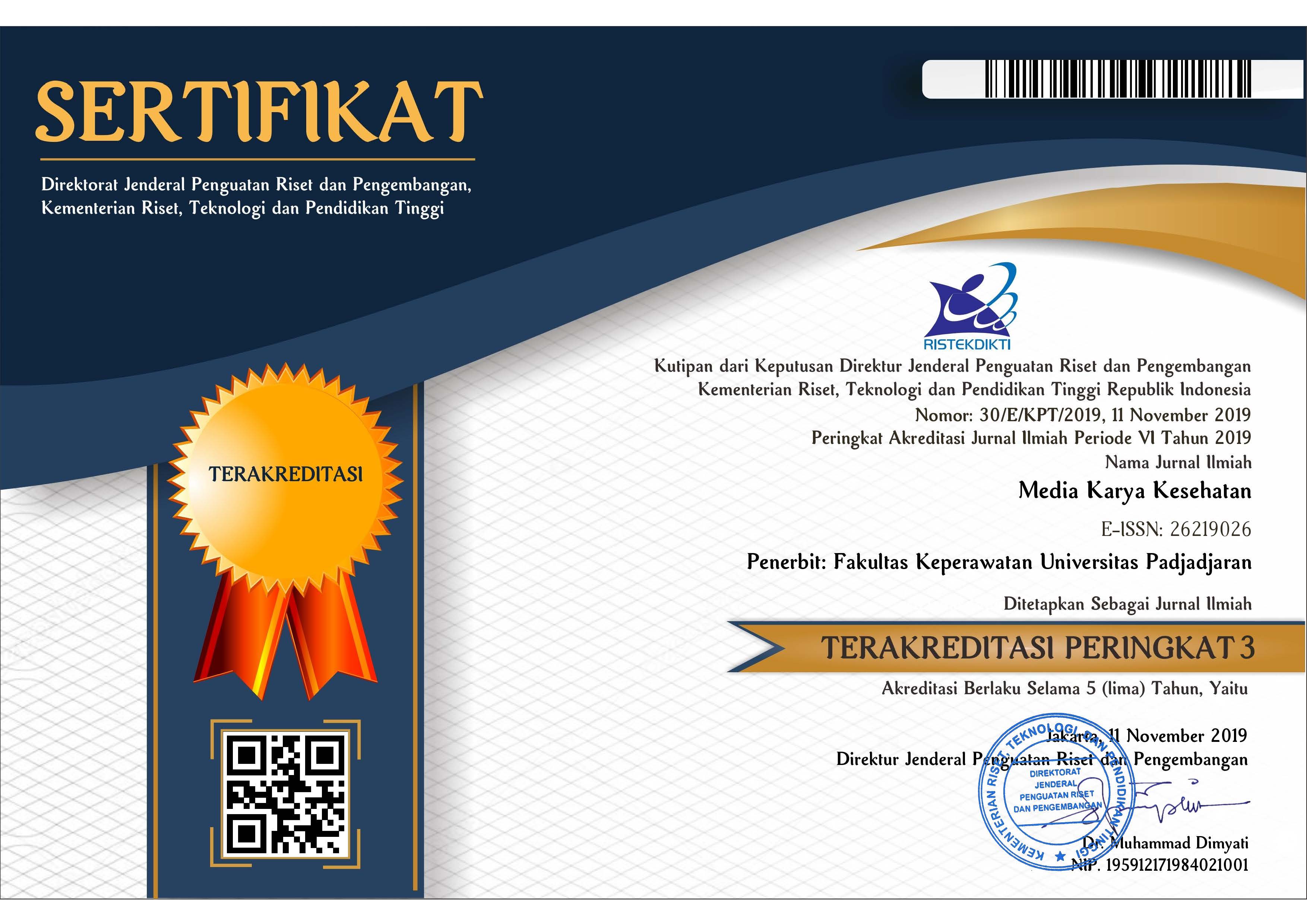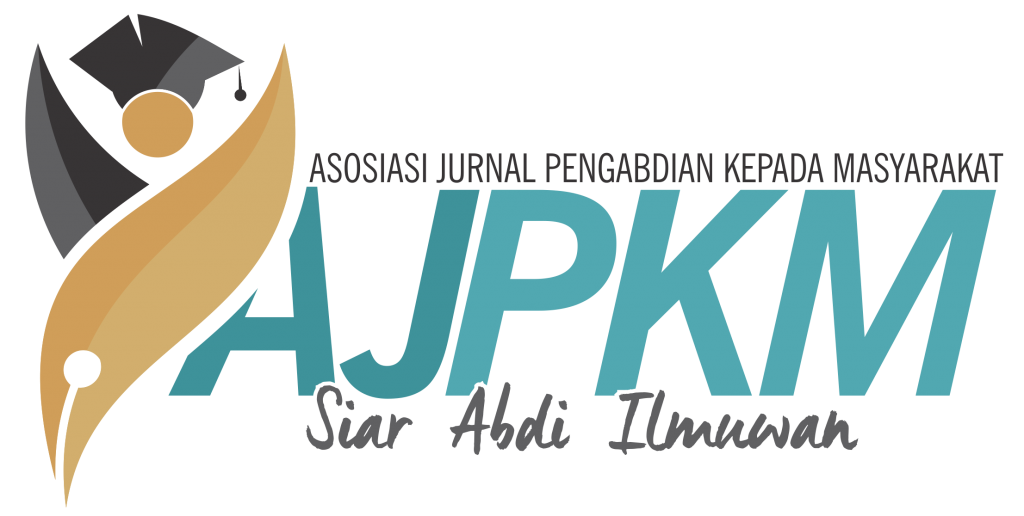The Education Effect of AADE7TM Model on Self-Care Activities in Type 2 Diabetes Mellitus Patients
Abstract
Diabetes mellitus (DM) is a chronic metabolic disorder characterized by high blood glucose levels due to a lack or ineffective use of the hormone insulin. If not treated properly, it will result in complications, even amputation and death. However, many patients still do not understand their disease, lack motivation, and have poor self-care activities. Therefore, it is important to provide education on the AADE7TM model, namely 7 tips for self-care habits, which have become a trademark of AADE, an organization consisting of multidisciplinary health professionals who are experts in diabetes education and diabetes self-care management. An organization comprises multidisciplinary health professionals who are experts in diabetes education and diabetes self-care management. The Seven tips include (1) eating healthy, (2) being active, (3) monitoring, (4) taking medication, (5) problem solving, (6) healthy coping, and (7) reducing risks so that there will be increased self-care activities. Objective to determine the effect of AADE7TM model education on self-care activities in type 2 diabetes mellitus patients. Research methods: Quantitative research type with quasi-experiment method, nonrandomized control group pre-test and post-test design. With purposive sampling on 30 patients, 15 patients in the experimental group and 15 in the control group. The experimental group was given AADE7TM model education, and the control group received conventional education. Data analysis techniques t-test. There was a difference in mean self-care in the experimental group in the pre-test, with a score of 19,800, and in the post-test, 33,066, with a p-value of 0.001.There was no difference in mean self-care in the control group at the initial and final measurements, with a p-value of 0.060. There was a difference in self-care activities after the AADE7TM model education in the experimental group compared to the final measurement in the control group, with a p-value of 0.001.
Conclusion: there was an influence of AADE7TM model education on self-care activities in type 2 diabetes mellitus patients.
Keywords: AADE7TM, self-care activities, diabetes mellitus.
Full Text:
PDF (Bahasa Indonesia)References
Agustiningrum, R., & Kusbaryanto, K. (2019). Efektifitas Diabetes Self Management Education Terhadap Self Care Penderita Diabetes Mellitus: A Literature Review. Jurnal Keperawatan Respati Yogyakarta, 6(2), 558–563. https://doi.org/10.35842/jkry.v6i2.309
Al-Ozairi, A., Taghadom, E., Irshad, M., & Al-Ozairi, E. (2023). Association Between Depression, Diabetes Self-Care Activity and Glycemic Control in an Arab Population with Type 2 Diabetes. Diabetes, Metabolic Syndrome and Obesity, 16(January), 321–329. https://doi.org/10.2147/DMSO.S377166
AlHaqwi, A. I., M.Amin, M., AlTulaihi, B. A., & Abolfotouh, M. A. (2023). Impact of Patient-Centered and Self-Care Education on Diabetes Control in a Family Practice Setting in Saudi Arabia. Int. J. Environ. Res. Public Health, 20(2), 1109. https://doi.org/https://doi.org/10.3390/ijerph20021109
Amalia, R., Kamil, H., & Mutiawati, E. (2022). Pengaruh Edukasi Terhadap Tingkat Selfcare Perempuan Penderita Diabetes Mellitus Tipe 2 Di Puskesmas Kuta Baro Aceh Besar. Jurnal Ilmu Keperawatan Unsyiah, 10(1), 10–22. https://etd.unsyiah.ac.id/index.php?p=show_detail&id=51963
American Diabetes Assosiation [ADA]. (2017). 2017 National Standards for Diabetes Self-Management Education and Support. Care.Diabetesjournals.Org, 40, 1409–1411. https://doi.org/10.2337/dci17-0025
American Diabetes Assosiation [ADA]. (2022). Standards of Medical Care in Diabetes—2022 Abridged for Primary Care Providers. Clin Diabetes, 40(1), 10–38. https://doi.org/10.2337/cd22-as01
American Diabetes Assosiation [ADA]. (2023). 12. Retinopathy, Neuropathy, and Foot Care: Standards of Care in Diabetes—2023. Diabetes Care, 46(1), S203–S215. https://doi.org/10.2337/dc23-S012
Anggraeni, A. F. N., Rondhianto, R., & Juliningrum, P. P. (2018). Pengaruh Diabetes Self-Management Education and Support (DSME/S) Terhadap Kualitas Hidup pada Pasien Diabetes Melitus Tipe 2. Pustaka Kesehatan, 6(3), 453. https://doi.org/10.19184/pk.v6i3.11688
Anggraini, R. B., & Prasillia, A. (2021). Hubungan Self care Terhadap Kualitas Hidup Pasien Diabetes Melitus : Study Literature. Nursing Science Journal (NSJ), 2(2), 63–74.
Association of Diabetes Care and Education Specialists (ADCES). (n.d.). Healthy Coping. Retrieved July 1, 2023, from https://www.diabeteseducator.org/docs/default-source/living-with-diabetes/tip-sheets/healthy-coping/healthy-coping-patient-flyer-v-1-(002).pdf?sfvrsn=66036959_0
Ayu Susilowati, A., & Nata Waskita, K. (2019). Pengaruh pola makan terhadap potensi resiko penyakit diabetes melitus. Jurnal Mandala Pharmacon Indonesia, 5(1), 43–47.
Bangun, A. V., & Ningsih, F. (2021). Terapi Psikoedukasi Terhadap Self Care Activity Pada Penderita Diabetes Mellitus. Journal of Telenursing (JOTING), 3(1), 1–7. https://doi.org/10.31539/joting.v3i1.2079
Bubnis, D. (2023). How to Start Exercising: A Beginner’s Guide to Working Out. Healthline. https://www.healthline.com/nutrition/how-to-start-exercising?utm_source=ReadNext
Chandrika, K., Das, B. N., Syed, S., & Challa, S. (2020). Diabetes Self‑Care Activities: A Community‑Based Survey in an Urban Slum in Hyderabad, India. Indian Journal of Community Medicine, 45(3), 307–310. https://doi.org/10.4103/ijcm.IJCM_236_19
Damhudi, D., Kertia, N., & Effendy, C. (2021). The Effect of Modified Diabetes Self-management Education and Support on Self-care and Quality of Life among Patients with Diabetic Foot Ulcers in Rural Area of Indonesia. Access Macedonian Journal of Medical Sciences, 9. https://doi.org/10.3889/oamjms.2021.6614
Dewi, M., Yellyanda, Y., & Ulfa, D. (2022). Edukasi Penatalaksanaan Diabetes terhadap Manajemen Perawatan Diri Pasien Diabetes Mellitus Tipe II. Jurnal Keperawatan Silampari, 5(2 SE-Articles). https://doi.org/10.31539/jks.v5i2.3583
Dinkes Sambas. (2022). Profil Kesehatan 2021 Dinkes Kabupaten Sambas. https://dinkes.sambas.go.id/profil-dinas-kesehatan/
Doenges, M. E., Moorhouse, M. F., & Murr, A. C. (2019). Nursing Care Plan: Guidelines for Individualizing Client Care Across the Life Span (J. Sharp (ed.); 10th ed.). F. A. Davis Company.
Dwitasari, A. (2023). 6 Jenis Olahraga untuk Penderita Diabetes dan Tips Aman Melakukannya. HelloSehat. https://hellosehat.com/diabetes/olahraga-untuk-penderita-diabetes/
Faswita, W., Nasution, J. D., & Elfira, E. (2022). Hubungan Kepatuhan Self Care Activity dengan Dukungan Keluarga Pada Penderita Diabetes Mellitus. JINTAN: Jurnal Ilmu Keperawatan, 2(2), 110–118. https://doi.org/10.51771/jintan.v2i2.358
Frisca, S., & Koerniawan, D. (2023). Edukasi Perawatan Kaki Efektif dalam Meningkatkan Pengetahuan dan Perilaku Pasien Diabetes Mellitus. Jurnal Keperawatan, 15(4 SE-), 1555–1562. https://doi.org/10.32583/keperawatan.v15i4.200
Gökdeniz, D., & Akgün Şahin, Z. (2022). Evaluation of Knowledge Levels About Diabetes Foot Care and Self-Care Activities in Diabetic Individuals. International Journal of Lower Extremity Wounds, 21(1), 65–74. https://doi.org/10.1177/1534734620926266
Heriyanti, H., Mulyono, S., & Herlina, L. (2020). Dukungan Keluarga Terhadap Self Care Pada Lansia Dengan Diabetes Melitus Tipe 2. Journal of Islamic Nursing, 5(1 SE-Vol.5 No.1), 32–37. https://doi.org/10.24252/join.v5i1.14145
Hidayatullaili, N. A., Musthofa, S. B., & Margawati, A. (2023). Literasi Kesehatan Media Terhadap Perilaku Pencegahan Penyakit Tidak Menular : (Literature Review). Jurnal Ners, 7(1 SE-Articles), 343–352. https://doi.org/10.31004/jn.v7i1.13325
Infodatin Kemenkes RI. (2020). Tetap Produktif, Cegah dan Atasi Diabetes Melitus. Infodatin (Pusat Data dan Informasi Kementerian Kesehatan RI.
International Diabetes Federation [IDF]. (2021). IDF Diabetes Atlas (E. J. Boyko, D. J. Magliano, S. Karuranga, L. Piemonte, P. Riley, P. Saeedi, & Hong Sun (eds.); 10th ed.).
Jannoo, Z., & Mamode Khan, N. (2019). Medication Adherence and Diabetes Self-Care Activities among Patients with Type 2 Diabetes Mellitus. Value in Health Regional Issues, 18, 30–35. https://doi.org/10.1016/j.vhri.2018.06.003
Lewis, S. L., Dirksen, S. R., Heitkemper, M. M., & Bucher, L. (2014). Medical Surgical Nursing: Assessment and Management of Clinical Problem (M. M. Harding (ed.); 9th ed.). Elsevier Mosby.
Llera-fábregas, A., Pérez-ríos, N., Camacho-monclova, D. M., & Ramirez-vick, M. (2022). Diabetes self-care activities and perception and glycemic control in adult Puerto Rican residents with Type 2 Diabetes : The LLIPDS Study. Journal of Public Health Research, 11(4), 1–12. https://doi.org/10.1177/22799036221125337
Łukasiewicz, A., Kiejna, A., Cichoń, E., Jodko-Modlińska, A., Obrębski, M., & Kokoszka, A. (2022). Relations of Well-Being, Coping Styles, Perception of Self-Influence on the Diabetes Course and Sociodemographic Characteristics with HbA1c and BMI Among People with Advanced Type 2 Diabetes Mellitus. Diabetes, Metabolic Syndrome and Obesity, 15, 407–418. https://doi.org/10.2147/DMSO.S320909
Mayo Clinic Staff. (2021). Exercise: 7 Benefits of Regular physical Activity. Mayo Clinic Web. https://www.mayoclinic.org/healthy-lifestyle/fitness/in-depth/exercise/art-20048389
Noviyanti, L. W., Suryanto, & Rahman, R. taufikur. (2021). Peningkatan Perilaku Perawatan Diri Pasien melalui Diabetes Self Management Education and Support. Media Karya Kesehatan, 4(1), 67–77. https://journal.unpad.ac.id/mkk/article/view/30747
Nugraha, M. I. (2021). Faktor Dominan yang Berhubungan dengan Self Care Pada Diabetisi. “ Suara Forikes”(Journal of Health), 12(April), 140–144. https://doi.org/10.33846/sf12nk227
Nurkamilah, N., Rondhianto, & Widayati, N. (2018). Pengaruh Diabetes Self Mangement Education and Support (DSME/S) terhadap Diabetes Distress pada Pasien Diabetes melitus Tipe 2 di RSD dr. Soebandi Jember. E-Jurnal Pustaka Kesehatan, 6(1), 133–140.
Pahm, M., & Pinder, J. (2023). The Impact of Diabetes Education on Behavior and Health-A Propensity Coarsened Exact Matching Application. International Journal of Health and Economic Development, 9(1), 1–23. https://www.researchgate.net/publication/363692863
Perkeni. (2021). Pedoman Pengelolaan & Pencegahan Diabetes Melitus tipe 2. PB Perkeni.
Popoviciu, M. S., Marin, V. N., Vesa, C. M., Stefan, S. D., Stoica, R. A., Serafinceanu, C., Merlo, E. M., Rizvi, A. A., Rizzo, M., Busnatu, S., & Stoian, A. P. (2022). Correlations between Diabetes Mellitus Self-Care Activities and Glycaemic Control in the Adult Population: A Cross-Sectional Study. Healthcare (Switzerland), 10(1). https://doi.org/10.3390/healthcare10010174
Priyanto, A., & Juwariah, T. (2021). Hubungan Self Care Dengan Kestabilan Gula Darah Pasien Diabetes Mellitus Type II. Jurnal Ilmu Kesehatan Vol, 10(1). https://doi.org/10.32831/jik.v10i1.376
Puskesmas Tekarang. (2022). Laporan Bulanan Diabetes Mellitus.
Rahmadiya, S., & Dahlia, D. (2022). Aktivitas fisik dan olahraga terhadap glikemik pada pasien diabetes mellitus (literatur review). Journal of Physical Activity, 3(1), 10–19. https://journal.apopi.org/index.php/jpa/article/view/39/15
Riskesdes. (2018). Riset Kesehatan Dasar Batlinkes.
Sepang, L. G., & Lainsamputty, F. (2022). Depresi Dan Korelasinya Dengan Domain Kualitas Hidup Pada Pasien Diabetes Melitus Tipe 2. Jurnal Ilmiah Keperawatan (Scientific Journal of Nursing), 8(1), 222–233. https://doi.org/10.33023/jikep.v8i1.1007
Siloam Hospital. (2023). 7 Olahraga untuk Penderita Diabetes yang Direkomendasikan. Siloamhospital.Com. https://www.siloamhospitals.com/informasi-siloam/artikel/jenis-olahraga-untuk-penderita-diabetes
Singh, S., Jajoo, S., Shukla, S., & Acharya, S. (2020). Educating patients of diabetes mellitus for diabetic foot care. PG - 367-373 LID - 10.4103/jfmpc.jfmpc_861_19 [doi]. J Family Med Prim Care, 2249-4863 (Print), 367–373. https://doi.org/10.4103/jfmpc.jfmpc_861_19
Smeltzer, S. C., Bare, B. G., Hinkle, J. L., & Cheever, K. H. (2010). Brunner & Suddarth’s Textbook of Medical-Surgical Nursing Volume 1 (Hilarie Surrena (ed.); twelfth ed).
Susanti, N., Nursalam, N., & Nadatien, I. (2023). Pengaruh Pengaruh Education And Support Group Berbasis Teori Self Care Terhadap Kepatuhan, Kemandirian Perawatan Kaki Dan Kadar Glukosa Darah Pada Pasien Diabetes Melitus Tipe 2. Jurnal Keperawatan Suaka Insan (JKSI), 8(1 SE-Articles). https://doi.org/10.51143/jksi.v8i1.413
The American Association for Diabetes Educator’s [AADE]. (2020). An Effective Model of Diabetes Care and Education: Revising the AADE7 Self-Care Behaviors®. Diabetes Educator, 46(2). https://doi.org/10.1177/0145721719894903
Tipane, J. (2023). The Top 10 Benefits of Regular Exercise. Healthline. https://www.healthline.com/nutrition/10-benefits-of-exercise
World Health Organization [WHO]. (2022). Physical Activity. Www.Who.Int. https://www.who.int/news-room/fact-sheets/detail/physical-activity
Wulandari Arifin, N. A. (2021). Hubungan Pengetahuan Pasien Diabetes Mellitus Tipe II dengan Praktik Perawatan Kaki dalam Mencegah Luka di Wilayah Kelurahan Cengkareng. Jurnal Keperawatan Muhammadiyah Bengkulu, 9(1), 1–10. https://doi.org/10.36085/jkmb.v9i1.1483
Yumuşak, B., Sezer, Ö., & Dağdeviren, H. N. (2022). Evaluation of Self-Care Levels and Affecting Factors in Diabetes Patients. Osmangasi Journal of Medicine. https://doi.org/10.20515/otd.1156785
DOI: https://doi.org/10.24198/mkk.v6i2.50166
Refbacks
- There are currently no refbacks.
JURNAL INI TERINDEKS DI:









Penerbit :
Fakultas Keperawatan, Universitas Padjadjaran
Jalan Raya Bandung-Sumedang Km. 21 Jatinangor, Sumedang, Indonesia 45363
WA: 085317736810
Tlp. 022-7795596
Email: info.mkk.keperawatan@unpad.ac.id
Email: novita.trivita@gmail.com

This work is licensed under a Creative Commons Attribution-NonCommercial 4.0 International License



